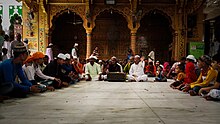
Back القوالي Arabic কাৱালী Assamese কাওয়ালি Bengali/Bangla Qawwali Catalan قەوالی CKB Qawwali German Qawwali Spanish قوالی Persian Qawwali Finnish Qawwalî French
This article needs additional citations for verification. (September 2018) |
| Part of a series on Islam Sufism |
|---|
 |
|
|

Qawwali (Urdu: قوّالی; Hindi: क़व्वाली; Bengali: কাওয়ালি; Punjabi: ਕ਼ੱਵਾਲੀ; Pashto: قاووالی) is a form of Sufi Islamic devotional singing originating in Hindustan. Originally performed at Sufi shrines or dargahs throughout Hindustan,[1] it is famous throughout Pakistan, India, Bangladesh and Afghanistan and has also gained mainstream popularity and an international audience as of the late 20th century.
While hereditary performers continue to perform Qawwali music in traditional and devotional contexts,[2] Qawwali has received international exposure through the work of Nusrat Fateh Ali Khan, Aziz Mian and Sabri Brothers largely due to several releases on the Real World label, followed by live appearances at WOMAD festivals. Other famous Qawwali singers include Fareed Ayyaz & Abu Muhammad, Rahat Fateh Ali Khan, Badar Miandad, Rizwan & Moazzam Duo, Qutbi Brothers, the late Amjad Sabri, Wadali Brothers, Nizami Bandhu, Bahauddin Qutbuddin, Aziz Naza, among others. Most modern Qawwali singers belong to the famed 'Qawwal Bachon ka Gharana' school of Qawwali, which was based in Delhi before 1947 and migrated to Pakistan after the Partition of British India.
- ^ Neubauer, Eckhard; Doubleday, Veronica (2001). Islamic religious music. Oxford Music Online. Oxford University Press. doi:10.1093/gmo/9781561592630.article.52787.
- ^ Qureshi, Regula (2001). Pakistan, Islamic Republic of. Oxford Music Online. Oxford University Press. doi:10.1093/gmo/9781561592630.article.20726.